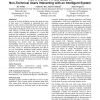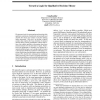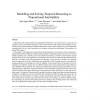129 search results - page 5 / 26 » Modeling how humans reason about others with partial informa... |
ATAL
2008
Springer
13 years 9 months ago
2008
Springer
The application of reinforcement learning algorithms to Partially Observable Stochastic Games (POSG) is challenging since each agent does not have access to the whole state inform...
CHI
2007
ACM
14 years 8 months ago
2007
ACM
In order to develop intelligent systems that attain the trust of their users, it is important to understand how users perceive such systems and develop those perceptions over time...
COGSCI
2002
13 years 7 months ago
2002
We address the problem of predicting how people will spontaneously divide into groups a set of novel items. This is a process akin to perceptual organization. We therefore employ ...
KR
1994
Springer
13 years 11 months ago
1994
Springer
We present a logic for representing and reasoning with qualitative statements of preference and normality and describe how these may interact in decision making under uncertainty....
AI
2008
Springer
13 years 7 months ago
2008
Springer
Representing and reasoning about time dependent information is a key research issue in many areas of computer science and artificial intelligence. One of the best known and widely...



